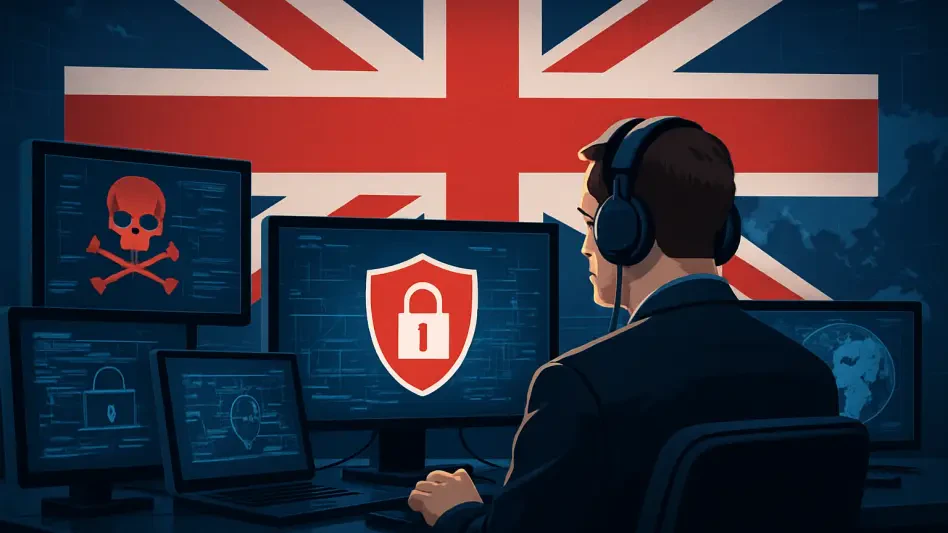In an era where digital connectivity underpins every aspect of life, a staggering reality emerges: every two days, a major cyber incident threatens to cripple vital UK services like water, energy, or healthcare, painting a grim picture of vulnerability. Imagine a hospital unable to access patient records during an emergency or a power grid faltering under a malicious attack from halfway across the globe. This unseen warfare in cyberspace is no longer a distant concern but a pressing national security crisis. The stakes couldn’t be higher as the UK grapples with defending its digital frontier against sophisticated, often state-backed adversaries. How is the nation responding to this relentless danger?
Why Cyber Threats Are the UK’s Silent Crisis
The gravity of cyber threats looms large over the UK, with the National Cyber Security Centre (NCSC) managing 204 significant incidents in the past year alone. These attacks aren’t mere inconveniences; they target the backbone of society—critical infrastructure that millions rely on daily. A single breach could disrupt transport networks, halt energy supplies, or compromise sensitive health data, creating chaos that ripples through communities. The question isn’t whether an attack will happen, but how severe the next one will be and whether defenses can hold.
Beyond individual sectors, the economic toll is immense, with 43% of UK businesses—over 600,000 organizations—experiencing a cybersecurity breach in the last 12 months. This pervasive risk transforms what might seem like a technical issue into a profound threat to public safety and national stability. As digital systems weave deeper into everyday life, the urgency to protect them escalates, placing cybersecurity at the forefront of government priorities.
The Alarming Scale of a National Security Challenge
Cyber threats have evolved from isolated hacks to coordinated campaigns often orchestrated by hostile states or criminal networks. These actors exploit vulnerabilities in an interconnected world, targeting everything from government databases to small businesses. The impact transcends financial loss; it undermines trust in institutions and jeopardizes essential services that keep society functioning. This isn’t just about stolen data—it’s about the potential collapse of systems people depend on without a second thought.
The societal implications are stark. A compromised water supply could endanger public health, while a breached energy grid might plunge entire regions into darkness. Economically, the cost of recovery and lost productivity mounts quickly, affecting livelihoods and national prosperity. With cyberspace as a battleground, the UK faces a challenge that demands not just reaction but a proactive, robust strategy to safeguard its future.
Crafting a Shield: The UK’s Multi-Layered Defense Strategy
To counter this escalating danger, the UK government has deployed a comprehensive, multi-faceted approach. Legislative reform leads the charge with the Cyber Security and Resilience Bill, updating outdated regulations to better protect essential services against evolving threats from state actors and cybercriminals. This legal framework aims to fortify defenses, ensuring that critical sectors are not left vulnerable to sophisticated attacks.
Operationally, the NCSC plays a pivotal role by managing incidents and offering tools like Share and Defend, which blocks malicious websites and curbs fraud. Economically, the cybersecurity sector contributes £13.2 billion annually and supports over 67,000 jobs, fueled by initiatives such as Cyber ASAP and Cyber Runway to drive innovation. Militarily, the National Cyber Force conducts offensive operations against hostile entities, while the Cyber and Electromagnetic Command integrates digital defense within NATO frameworks. Globally, partnerships through the Pall Mall Process and EU dialogues address the borderless nature of cyber threats, showcasing a strategy that spans policy, technology, and international cooperation.
Each element of this defense—legislation, operations, economic investment, military action, and global alliances—works in tandem to create a resilient shield. Supported by concrete data, such as the sector’s economic impact, and real-world examples like NCSC’s incident response, this approach demonstrates a commitment to tackling cyber risks on every front. The result is a dynamic response tailored to a complex, ever-shifting threat landscape.
Expert Perspectives from the Cyber Battleground
Insights from those on the frontlines underscore the gravity of the situation. The NCSC has noted a marked increase in the sophistication of state-backed attacks, warning that adversaries are leveraging advanced techniques to penetrate even well-secured systems. This perspective highlights the need for constant vigilance and adaptation, as yesterday’s defenses may not hold against tomorrow’s tactics. Industry leaders echo this concern, praising tools like the Cyber Governance Code of Practice for providing practical guidance but stressing the challenge of keeping pace with rapid threat evolution.
A striking statistic bolsters these views: businesses enrolled in the Cyber Essentials program, with over 51,000 certificates issued in the past year, report a 92% reduction in insurance claims related to cyber incidents. This tangible benefit illustrates the value of government-backed initiatives. Additionally, a critical infrastructure operator recently shared how the Cyber Assessment Framework helped avert a potentially catastrophic breach, revealing a human story of resilience amid digital warfare. These voices collectively paint a picture of a nation under siege but fighting back with determination and expertise.
Empowering Resilience: Practical Steps for a Secure Tomorrow
Beyond government action, building a cyber-resilient UK requires involvement from businesses, infrastructure operators, and individuals. Adopting baseline security through the Cyber Essentials certification offers a starting point, equipping organizations with fundamental protections against common threats. The NCSC’s online guidance further supports risk management, providing accessible resources to identify and mitigate vulnerabilities before they are exploited.
Collective action is also key, with the upcoming refresh of the National Cyber Strategy set to outline a vision for collaboration across sectors. This framework encourages businesses to join forces with regulators and law enforcement to strengthen national defenses. More importantly, the emphasis on resilience over mere prevention ensures that recovery mechanisms are in place, allowing rapid response and restoration after an attack. Tailored to the UK’s unique digital needs, these steps aim to create a culture of preparedness at every level of society.
Reflecting on a Digital Defense Journey
Looking back, the UK has confronted an unprecedented wave of cyber threats that tested the nation’s resolve. Each incident, from breaches in critical infrastructure to widespread business disruptions, has underscored the urgency of robust defenses. The government’s multi-layered strategy, spanning legislation, innovation, and global partnerships, has laid a foundation for security in a hyper-connected age. Military efforts and economic investments have further fortified this stance, proving that cybersecurity is as much about opportunity as it is about protection.
As the battle in cyberspace persists, actionable steps emerge as the path forward. Businesses are encouraged to leverage government tools like Cyber Essentials to safeguard operations, while individuals can stay informed through NCSC resources. Policymakers must continue prioritizing resilience, ensuring rapid recovery mechanisms are embedded in national plans. Ultimately, the fight against cyber threats demands sustained collaboration—across borders, industries, and communities—to secure a digital future that balances innovation with safety.








